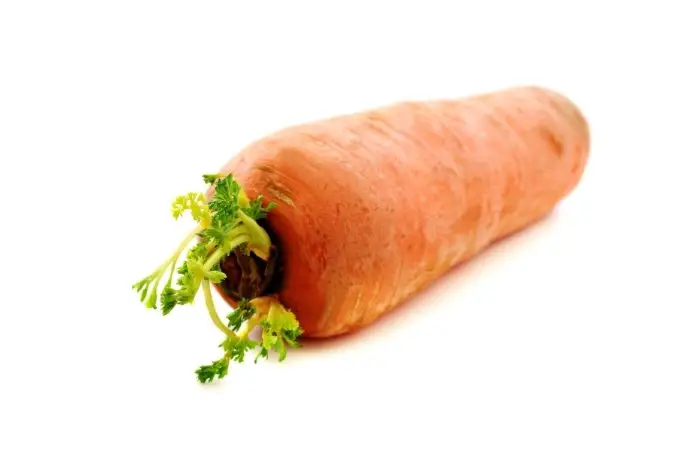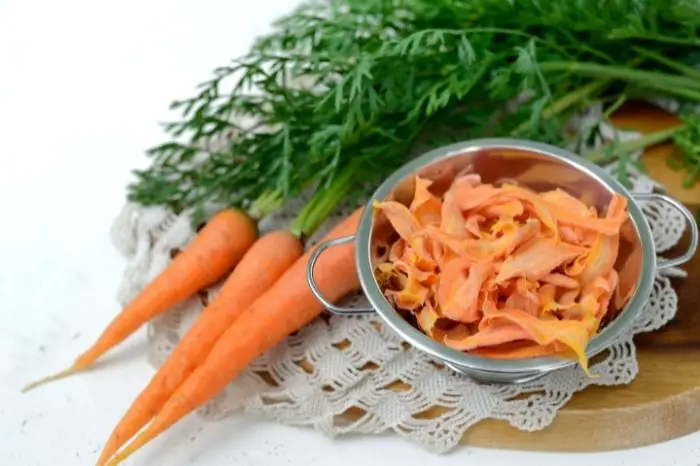Last Updated on December 7, 2022
Ever wondered if you can eat carrots that have sprouted? Generally, carrots are root vegetables that love to seek moisture by continually growing small roots even after harvesting or buying them.
So, you may have encountered picking some carrots and you notice after a while it begins to sprout some small roots. Then you’re wondering if they are still safe to cook and consume. Or if cooking these sprouted carrots will have any effects on the taste of your food.
Well, the answer is simply yes! You can certainly eat carrots that have sprouted. So, we will be looking more into how safe it is to make use of carrots that have some roots growing even after picking and many more. So let’s begin.
Are Sprouted Carrots Safe To Eat?
People often wonder what to do with sprouted carrots. Carrot sprouting after harvesting them is not uncommon. But generally, carrots that have sprouted are still viable to eat or consume. All you need do is simply remove or peel off the small roots and consume.
However, if you notice the sprouted carrots have started growing slimy or are turning white, then they may be past their prime stage and it’s best not to consume such. If you also notice some dark brown spots all over the sprouted carrots, you should discard them right away.

Carrots that have some roots sprout tend to taste bland. But it’s best to make use of them in your various food recipes if the sprouted roots are big enough.
Read more about What Are White Carrots Called?
Why Do Carrots Sprout Even After Harvesting And Storing
Carrots are root vegetables so this means the carrots we consume are typically roots that have developed in their first year.
If the carrot which is the root vegetable was left in the ground to continue to grow, it will give rise to a group of flowers above the ground. This will later result in seeds at the end of their second year.
Therefore, when you find the carrots you’ve kept in the kitchen starting to germinate fine roots along the orange root, don’t be surprised. It’s just a way of these carrots seeking continuous moisture because that’s what any root tends to do. So, you may see some small, string-like roots sprouting.
However, take note that these small string-like roots won’t turn into more carrots. However, the upper parts of the carrot root naturally simply wish to keep on growing into its flowering phase.
Can You Grow Sprouted Carrots?
Carrots that have sprouted can be grown. They will give rise to attractive lacy fronds in just a couple of days. They will later grow into lacy white flowers that can attract butterflies if you plant them outdoors.
How Can Carrots Be Stored Without Sprouting?
If you wish to prevent your carrots from growing small roots or sprouting while you store them, simply remove the greens on the top before you store them. Removing the greens on top of the carrots will deprive the carrots of moisture as time goes on. Make sure you do not wash the carrots if you don’t plan on consuming them soon.
Here are ways you can successfully store carrots without having them sprout:
1. Refrigeration Storage
It’s possible to store carrots in the fridge for a period of 2 to 3 months. Simply take the green part out and keep the carrots in an air-tight container or a plastic bag. Make sure you squeeze the air out and keep them away from moisture.
Alternatively, you can also store carrots in the fridge by putting them in a bowl full of water. The water full of the bowl should be covered using a lid or plastic wrap. Make sure you replace the water when they become milky or cloudy.
However, note that this method of putting carrots in a bowl full of water is not long-term storage. You can only store them for about a week using this method. Once it’s past a week, they tend to start showing slimy features.
2. Freezer Storage
You can freeze carrots for as long as a year. However, to achieve freeze-storing carrots successfully, you need to blanch them first.
To blanch carrots, put them in boiling water and allow them to scald for some time. When you do this blanching, you are simply rendering some of their enzymes inactive. These enzymes are responsible for continually degrading the quality of the carrot.
Prepworks by Progressive Produce ProKeeper, 3-Quart, Stay-Fresh Vent System
Once you’re done blanching, take them out of the water and allow them to cool down. Then peel these carrots and cut or slice them to your desired shapes and sizes. Put these sliced carrots into a freezer bag and you can store them for up to 9 months.
Storing these same carrots in a vacuum bag inside the deep freezer can be stored for up to 12 months.
3. Pickling
Pickling is another great way of storing carrots. Simply immerse carrots in vinegar alongside other vegetables such as cucumbers, peppers, and chilies.
Using vinegar which is an acetic acid solution is just to slow down microbial growth due to its low pH.
Check Out Everything You Need to Know Regarding Raised Garden Beds
4. Drying
To store carrots by drying, first, wash and peel the carrots. Then cut them into 2 to 4 mm thick. Then these sliced carrots should be spread evenly in a food dehydrator at 55 degrees Celsius for around 10 hours.
Carrots that have been shredded will take about 6 to 10 hours. You can then store the resulting dried carrot flakes in an air-tight container to be kept in a dry and dark place.
You can blend these flakes into fine powder. These dried carrots in flakes or powder can as well be added to drinks, casseroles, and soups.

How Long Does It Take Carrots to Germinate Outside?
Carrots germinate slowly. If you want to speed up the process, you can prime the seeds indoors. To do this:
- Soak the carrot seeds in water for an hour.
- Transfer them to a damp paper towel.
- Fold the paper towel to enclose the seeds.
- Place them in an airtight container for a few days.
Once you plant the carrot seeds, lightly water the area. The soil should be kept moist for the germination period. This is usually between 1 and 3 weeks.
What Temperature Do Carrots Need to Germinate?
Carrot seeds need a soil temperature of at least 80 degrees to germinate. This will ensure your seeds germinate healthily and on time. While the germination of carrot seeds is typically uneven, this temperature will help you get the best results.
Do Carrots Need Sun to Germinate?
Carrots are root vegetables. All the veggies and fruit in the root category need full sun to thrive. You should choose a spot in your garden that gets at least six hours of direct sunlight daily if you want your carrots to yield a big harvest.
When Do You Plant Carrot Sprouts?
If your carrots have started to sprout, these pieces don’t have to go to waste. You can replant the sprouted carrot tops to grow new ones. Follow these steps to plant and grow carrot sprouts:
- Make a clean cut just below the top where the carrot started sprouting. You should leave at least an inch of the stem intact.
- Place the carrot tops upside down in a shallow container with water. Don’t submerge them. Place the container in a warm but shady spot.
- The carrots will start shooting roots within a few days. The roots will be tiny and hair-like.
- Plant the carrots in soil that has plenty of nutrients.
It’s best to plant carrot sprouts when temperatures are cool. At night, temperatures should drop to about 55 degrees. Daytime temperatures should average 75 degrees.
How Often Do You Water Carrot Sprouts?
You should water your carrot sprouts every third day, depending on how fast the soil dries. Carrots need about 1 inch of water weekly. If they don’t get enough water, your carrots could become misshapen or taste bitter.
I suggest setting a timer to ensure you water your carrots on time. You should also do a moisture test to determine how often your carrots need watering.
What Do Baby Carrot Sprouts Look Like?
Once your veggies or fruit are in the ground, it can be difficult to identify them when they start growing. Often times weeds come up with them. If you want to keep these in control, you need to know what not to pluck!
Baby carrot sprouts are relatively easy to identify. The first leaves to emerge will look like grass seedlings. They have sharp, long blades and short stems. After a few days, true leaves will join them. These have long stems and curly leaves.
By the second month, your carrot sprouts will have more true leaves. These will have higher stems and be easier to identify.
Conclusion On Can You eat Carrots That Have Sprouted
So, we have pointed out that you can still eat carrots that have sprouted. Just make sure they have not started growing slimy or turning white. If you however notice some dark brown spots all over the body of the carrots, they aren’t safe to consume so discard them immediately.
We have also listed out some ways you can successfully store your carrots to prevent them from sprouting or growing any small stringy roots.
FAQs
Is it OK to eat sprouted carrot?
This is a common question among people who are just starting with sprouting. They have been told that sprouting makes the carrot more nutritious and digestible, so they want to know if they can eat the sprouted carrot.
They're perfectly fine to eat. Just like you'd eat a sprout from a normal carrot, you can eat a sprout from a sprouting carrot. They seem to have a very mild taste, not really like anything.
Carrots are a root vegetable and are not considered a fruit. They should be eaten raw or cooked only. You can eat them as long as they are not rotten.
If you sprout them with the intention of eating them raw, then you are doing so on your own accord and can decide for yourself what you want to do.
Are sprouted carrots good for juicing?
I think sprouting carrots are quite fine in taste, especially if you have a juicer (like a masticating juicer) and can add the sprouts to your juice. As for recipes for sprouted carrot juice, I am pretty sure there are plenty out there. If you google "sprouted carrot juice recipes" you'll find many. If you want to try, I suggest that you sprout your carrots in the morning and then make your juice in the afternoon.
How are sprouted carrots prepared for sale?
The carrots are cut, washed, and then allowed to sprout for two weeks before being harvested. They are then dried and packaged. Sprouts are easy to grow at home and can be used in salads, soups, and other recipes.
They are a healthy and versatile food. They can be used as a topping for pizza.
Are there benefits to eating sprouted carrots?
The benefits of sprouting can be seen in many different parts of the world. In China, the Chinese eat more sprouts than any other food. In India, sprouts are considered a blessing. In Japan, they are one of the most popular vegetables.
However, the science tells a different story when it comes to carrots. Unlike seeds, they are less nutritious after sprouting when it comes to certain nutrients.
The vitamin and mineral content is much lower than raw ones. Vitamins B12, C, E, K, and folic acid are only present in trace amounts. The phytochemicals (e.g., flavonoids, carotenoids, phenols) are also significantly reduced.
Sprouted carrots have been a popular staple in the sprout world for over 30 years now, and they are a nutritional powerhouse. Sprouted carrots contain a large amount of B-vitamins, antioxidants, and even minerals like magnesium and zinc.

Eunice is an enthusiastic gardener with a passion for growing beautiful flowers. She loves nothing more than spending time in her garden, tending to her plants and enjoying the outdoors. Eunice has been gardening for over 15 years and has developed a unique style of landscaping that is both practical and aesthetically pleasing. She is especially fond of growing roses and enjoys experimenting with different varieties and colors. Eunice takes great pride in her garden and often shares the fruits of her labor with friends and family. In her spare time, she enjoys reading gardening magazines and attending local horticulture events. Eunice is passionate about her hobby and is always eager to share her knowledge and experience with others.

